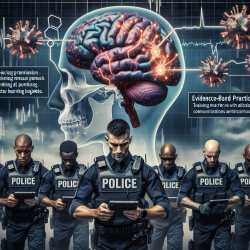Introduction
In the ever-evolving landscape of law enforcement, the integration of scientific research into training practices is paramount. The study "Complex Motor Learning and Police Training: Applied, Cognitive, and Clinical Perspectives" offers a wealth of insights that can significantly enhance the skills of practitioners in the field. This blog aims to distill key findings from the research and provide actionable recommendations for practitioners seeking to improve their training methods and outcomes.
Understanding Complex Motor Learning
Complex motor learning involves acquiring and refining skills that require the integration of sensory, motor, and cognitive functions. For police officers, this includes not only the physical handling of equipment but also situational awareness and decision-making under stress. The research highlights that these skills are not innate but can be developed through rigorous training and experience.
Key Insights from the Research
- Neurophysiological Mechanisms: The study underscores the importance of understanding the brain's role in motor learning. The Mirror Neuron Network (MNN) facilitates imitation-based learning, crucial for police training.
- Stress and Performance: Stress significantly impacts learning and performance. The research suggests that moderate stress levels can enhance learning, while extreme stress can hinder it. Training programs should aim to simulate realistic stress levels to optimize learning outcomes.
- Scenario-Based Training: The gold standard for police training involves scenario-based exercises that mimic real-world situations. This approach not only enhances motor skills but also prepares officers for the complexities of fieldwork.
Recommendations for Practitioners
Based on the research findings, practitioners are encouraged to adopt the following strategies:
- Incorporate scenario-based training that simulates real-world stressors to enhance decision-making and motor skills.
- Utilize evidence-based practices to continually update training programs, ensuring they align with the latest scientific insights.
- Engage in interdisciplinary collaborations to foster a comprehensive understanding of motor learning and its applications in law enforcement.
Encouraging Further Research
While the current research provides valuable insights, there is a need for ongoing studies to further elucidate the neurophysiological mechanisms underlying complex motor learning in police training. Practitioners are encouraged to participate in research initiatives and contribute to the growing body of knowledge in this field.
To read the original research paper, please follow this link: Complex Motor Learning and Police Training: Applied, Cognitive, and Clinical Perspectives.










